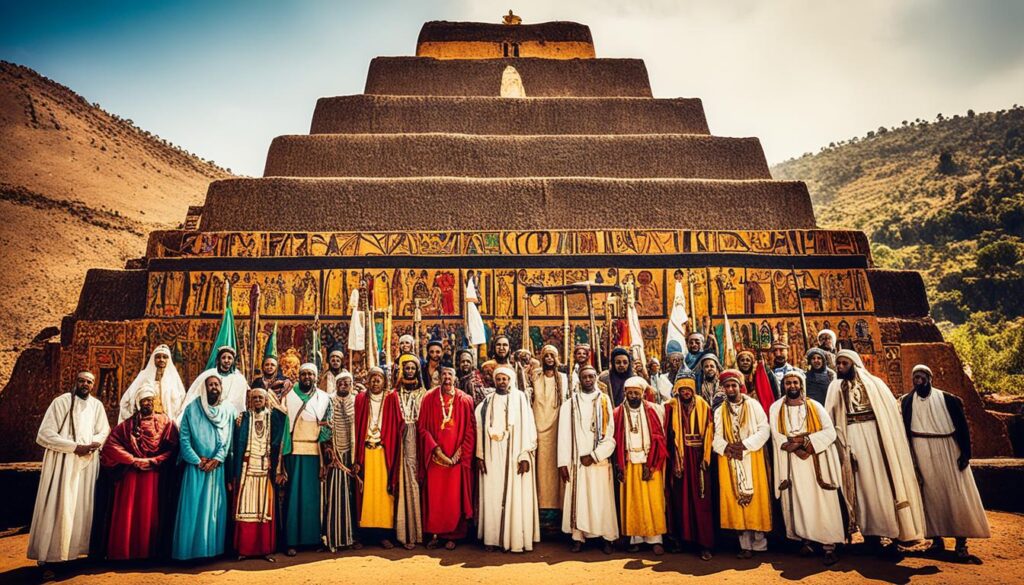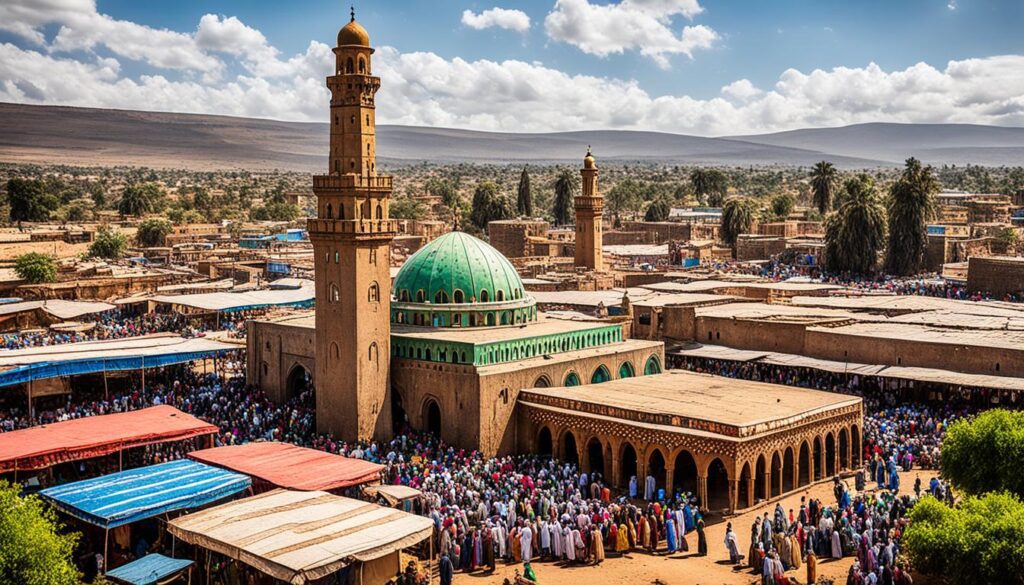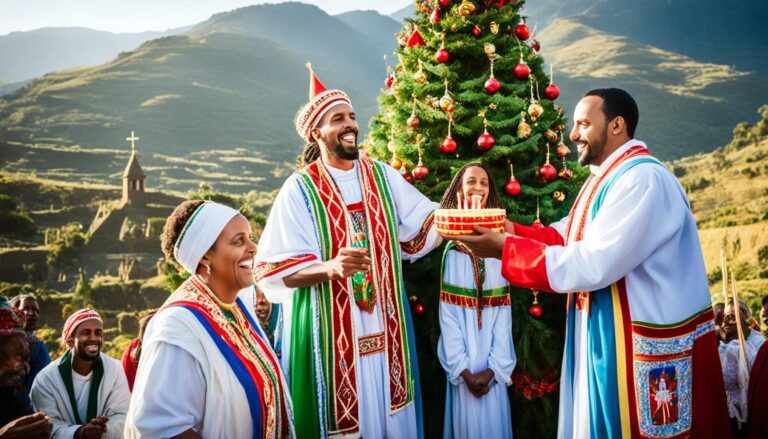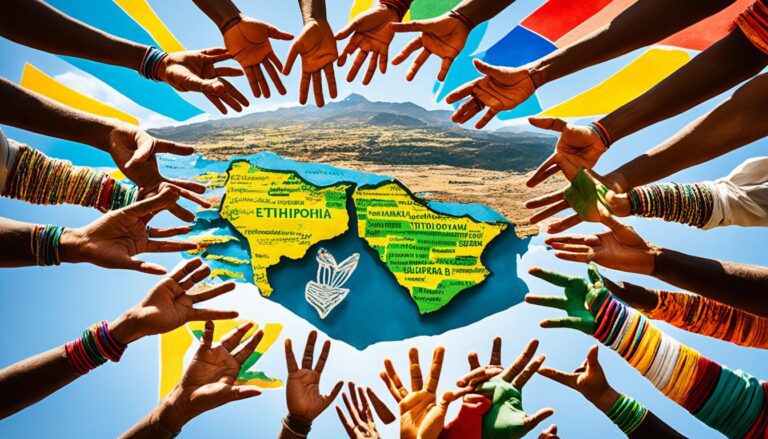Is Ethiopia a Muslim Country?
Did you know that Ethiopia, a country known for its rich cultural heritage, boasts a diverse religious makeup? While Christianity is the dominant faith, there is a significant Muslim population as well. According to data from 2016, Islam comprises 31.3% of the Ethiopian population, making it the second-largest religion in the country. This surprising statistic highlights the religious diversity of Ethiopia and sets the stage for a deeper exploration of its religious landscape.
Key Takeaways:
- Christianity is the dominant religion in Ethiopia, with a majority of the population identifying as Orthodox Christians.
- Islam is the second-largest religion in Ethiopia, representing 31.3% of the population.
- Aside from Christianity and Islam, Ethiopia is home to small communities of Ethiopian Jews, Baháʼís, and practitioners of traditional African religions.
- The religious landscape of Ethiopia has shaped the country’s history, culture, and identity.
- While Ethiopia is officially a secular state, tensions and conflicts between different religious communities have emerged in certain areas.
Now that we have set the stage with this surprising fact, let’s delve into the fascinating religious diversity of Ethiopia and explore the history, current state, and challenges of religious coexistence in this remarkable country.
Religious Diversity in Ethiopia
Ethiopia is a country renowned for its rich religious diversity. In addition to Christianity and Islam, there are also small communities of Ethiopian Jews, Baháʼís, and practitioners of traditional African religions. This diverse religious landscape contributes to the vibrant and varied cultural fabric of the nation.
Muslim communities in Ethiopia play a significant role in shaping the religious tapestry of the country. They are concentrated in regions such as Afar, Oromia, and Somali, where they have established strong and vibrant communities. Ethiopian Muslims bring their unique customs, traditions, and rituals to the broader cultural mosaic of the nation, creating a blend of faith, heritage, and identity.
“The religious diversity of Ethiopia reflects the country’s commitment to tolerance and coexistence among different faiths. It is both a testament to our collective ability to embrace multiple beliefs and an inherent part of our national identity.”
The traditions, customs, and cuisine of Ethiopian Muslims have been shaped by their religious practices. From the observance of Ramadan to Eid al-Fitr celebrations, Ethiopian Muslim culture encompasses a wide range of religious festivities and rituals that are deeply rooted in their faith. These practices are often intertwined with the social fabric of Ethiopian society, creating a unique blend of religious and cultural traditions.
As we explore the religious diversity in Ethiopia, it is important to appreciate the contributions of all religious communities and recognize the significance of their cultural heritage. The coexistence of different faiths is a cornerstone of Ethiopia’s national identity and serves as a source of unity and strength.
The History of Religion in Ethiopia

Religion has played a significant role in Ethiopian history. The country has a rich and diverse religious heritage, with a long-standing presence of both Christianity and Islam.
In the 4th century, Ethiopia became one of the first countries in the world to adopt Christianity as its official religion. This historical event has had a profound impact on the country’s culture, traditions, and identity. The Ethiopian Orthodox Church, an Oriental Orthodox Church, emerged as the largest Christian denomination in Ethiopia, shaping the religious landscape for centuries.
Islam also has deep roots in Ethiopia. Its history in the country dates back to the 7th century when a group of Muslims sought refuge in Ethiopia, escaping persecution in Mecca. This early arrival of Islam laid the foundation for the Muslim community that continued to grow over time.
“Ethiopia’s rich religious history encompasses the early adoption of Christianity and the existence of an established Muslim community dating back centuries.”
Throughout its history, Ethiopia has been known for its religious tolerance and coexistence between different faiths. While the majority of the population identifies as either Christian or Muslim, there are also smaller communities of Ethiopian Jews and practitioners of traditional African religions.
Timeline of Religious History in Ethiopia
| Century | Religious Events |
|---|---|
| 4th century | Ethiopia adopts Christianity as its official religion |
| 7th century | Arrival of Muslims seeking refuge in Ethiopia |
| 16th century | Introduction of Protestantism by European missionaries |
| 19th century | Ethiopian Jews face persecution and migration |
| 20th century | Growth of Protestant churches and revival movements |
As the religious landscape of Ethiopia has evolved over time, so too has the country’s cultural identity. Today, the coexistence of Christianity and Islam continues to shape Ethiopian society, with both faiths coexisting in harmony.
Next, we will explore the current religious landscape of Ethiopia, delving into the dominance of the Ethiopian Orthodox Church, the presence of Islam, and the growth of Protestantism across the country.
The Current Religious Landscape

In modern-day Ethiopia, the religious composition reflects the country’s rich diversity. The Ethiopian Orthodox Church remains the largest religious group, with approximately 43.8% of the population identifying as Orthodox Christians. Islam holds a significant presence, with 31.3% of the population following the Islamic faith. Protestantism has experienced substantial growth in recent decades and now represents around 22.8% of the population.
This diverse religious landscape reflects the complexities of religious coexistence in Ethiopia. While the majority of Ethiopians adhere to Orthodox Christianity, the presence of Islam and Protestantism showcases the country’s tolerance for different religious beliefs and practices.
“Our religious landscape is a testament to Ethiopia’s commitment to embracing diversity and allowing different faiths to coexist harmoniously.”
However, tensions and conflicts between different religious communities have emerged in certain areas. These conflicts underline the challenges inherent in navigating the complexities of religious diversity.
The Ethiopian Orthodox Church
The Ethiopian Orthodox Church, also known as the Ethiopian Tewahedo Church, plays a central role in the religious and cultural life of the country. It is one of the oldest Christian churches in the world and has deep historical roots in Ethiopia.
The Ethiopian Orthodox Church follows its unique traditions and practices, blending elements of Christianity with indigenous Ethiopian culture. It emphasizes the importance of rituals, sacraments, and worship within its religious observances.
Protestantism in Ethiopia
Protestantism has seen significant growth in Ethiopia, particularly in urban areas. The introduction of Protestant denominations into Ethiopian society has brought new theological perspectives and forms of worship. Protestant churches have also played a pivotal role in education, healthcare, and social services.
“The rise of Protestantism in Ethiopia has contributed to the religious diversity of our nation, providing alternative expressions of faith and enhancing the overall religious landscape.”
While representing a minority in terms of overall population, Protestant communities have made significant contributions to Ethiopia’s social fabric and continue to shape its cultural identity.
Religious Coexistence and Challenges
The religious makeup of Ethiopia reflects a history of coexistence and interaction between different faiths. However, tensions and conflicts between religious communities have emerged in certain regions, often resulting from socio-political dynamics or differing religious practices and beliefs.
Efforts to promote understanding, dialogue, and respect among different religious groups are vital to maintaining peaceful coexistence in Ethiopia.
Government and Religion in Ethiopia
Ethiopia is officially a secular state, offering extensive freedom of religion to its citizens. The country’s constitution guarantees the right to worship and prevents religious discrimination. The government of Ethiopia strives to maintain a strict separation between religion and the state, ensuring that no religious group infringes upon the affairs of the government, and vice versa.
However, despite these principles of religious freedom, the application of these policies has been inconsistent at times. The Ethiopian government retains some influence over religious matters, such as registering religious groups and allocating land for religious purposes.
It is important to note that there have been incidents of religious tensions and conflicts in Ethiopia. Ongoing efforts are required to promote religious freedom and peaceful coexistence among different religious communities.
Overall, the Ethiopian government aims to protect the rights of all individuals to practice their respective religions while maintaining social harmony and preventing religious discrimination.
“We believe in fostering an inclusive society that respects the freedom of religious belief and promotes mutual understanding among diverse religious communities.”
| Government’s Role in Religion | Key Aspects |
|---|---|
| Registration of Religious Groups | Ensuring accountability and compliance with regulations |
| Allocation of Land for Religious Purposes | Facilitating the establishment and expansion of places of worship |
| Religious Education | Supervising religious education programs and curriculum |
| Interfaith Dialogue | Promoting understanding and cooperation among different religious communities |
| Preventing Religious Discrimination | Enforcing laws to protect individuals from discrimination based on their religious beliefs |
Religious Conflicts in Ethiopia
Despite the religious diversity in Ethiopia, inter-religious tensions and conflicts have emerged in various parts of the country. These conflicts have been influenced by several factors, including changes in the political landscape, the growth of Protestantism and Islam, responses from the Ethiopian Orthodox Church, and the entry of religion into public political discourse. Unfortunately, these conflicts have often escalated into acts of religious violence, straining relations between different religious communities.
Efforts to address and resolve these conflicts require open dialogue, empathy, and understanding among religious leaders and communities. By fostering a culture of mutual respect and promoting interfaith dialogue, we can work towards peaceful coexistence and the prevention of further religious conflicts.
“Religion should never be a cause for violence and division. Rather, it should serve as a catalyst for unity, compassion, and understanding among people of different faiths.”
– Ethiopian Interfaith Council
It is crucial to acknowledge that religious conflicts in Ethiopia are complex issues that require comprehensive strategies and collaboration from all stakeholders. The government, religious leaders, civil society organizations, and the wider community must come together to address the root causes of these conflicts and foster an environment of religious tolerance and harmony.
The Impact of Religious Conflicts
Religious conflicts in Ethiopia have had far-reaching consequences. Not only do they result in loss of lives and property, but they also contribute to social unrest, hinder economic development, and undermine the nation’s unity. These conflicts divide communities along religious lines, erode trust, and weaken the social fabric of the country.
Additionally, religious conflicts can have a detrimental effect on Ethiopia’s image internationally. They may deter foreign investment, disrupt tourism, and strain diplomatic relations. Therefore, it is crucial for Ethiopia to address and resolve these conflicts to ensure the country’s stability, prosperity, and standing in the global community.
Strategies for Conflict Resolution
To effectively address religious conflicts in Ethiopia, a multi-faceted approach is necessary. Here are some key strategies that can contribute to conflict resolution:
- Promoting interfaith dialogue and understanding: Facilitating open and respectful conversations among religious leaders and communities can help foster empathy, dispel misconceptions, and build trust.
- Encouraging peaceful coexistence: Emphasizing the shared values of compassion, peace, and justice among different religious groups can promote acceptance, tolerance, and harmony.
- Strengthening legal frameworks: Enhancing laws and regulations that protect religious freedom and prevent discrimination can provide a solid foundation for peaceful coexistence.
- Investing in education and awareness: Promoting religious literacy and cultural sensitivity through educational programs can help combat ignorance, prejudice, and stereotypes.
- Engaging civil society organizations: Collaborating with grassroots organizations and NGOs that specialize in conflict resolution and interfaith dialogue can amplify efforts to address religious tensions.
By implementing these strategies and fostering a culture of understanding and respect, Ethiopia can overcome religious conflicts and build a society characterized by religious harmony and peaceful coexistence.
Major Religious Conflicts in Ethiopia
| Date | Location | Religious Groups Involved | Casualties |
|---|---|---|---|
| 2006 | Bahir Dar | Christian and Muslim communities | Over 80 deaths, numerous injuries |
| 2011 | Arsi Negele | Oromo and Muslim communities | Several deaths, displacement of residents |
| 2018 | Jijiga | Amhara and Somali communities | Dozens killed, displacement, and property damage |
| 2020 | Burayu | Oromo and Christian communities | Several deaths, destruction of properties |
Conclusion
Ethiopia’s religious landscape is a tapestry of diversity and historical significance. Christianity stands as the dominant faith, with a majority of the population identifying as Ethiopian Orthodox Christians. However, Islam also holds a significant presence, and various other religious communities exist across the country.
The Ethiopian government has set the stage for religious freedom and aims to prevent discrimination, but challenges persist. Instances of religious tensions and conflicts have highlighted the importance of fostering religious tolerance and peaceful coexistence. It is crucial to continue efforts in promoting understanding and dialogue among different religious groups.
The religious fabric of Ethiopia is interwoven with its rich cultural heritage, shaping the country’s identity. The traditions, rituals, and practices of Christianity, Islam, and other religions contribute to the unique tapestry that makes up the religious landscape of Ethiopia.






